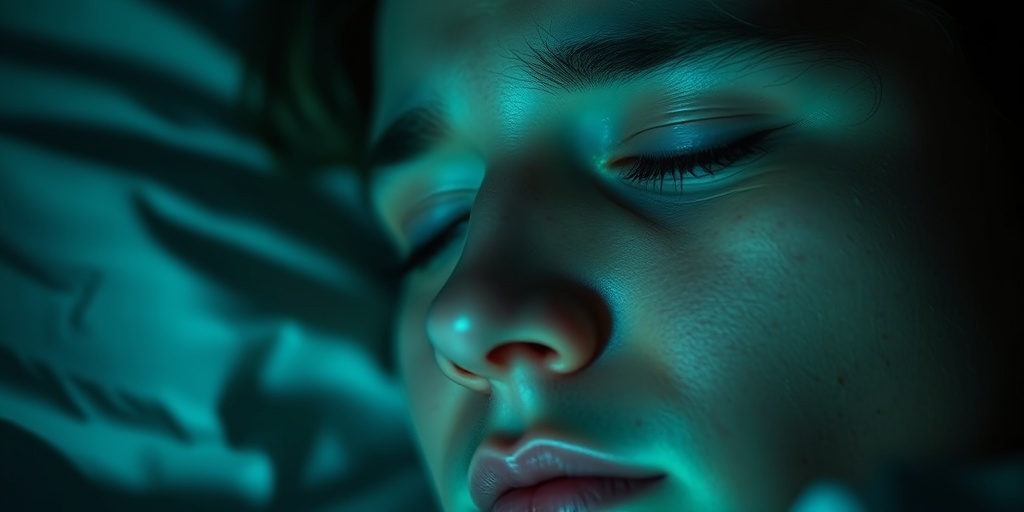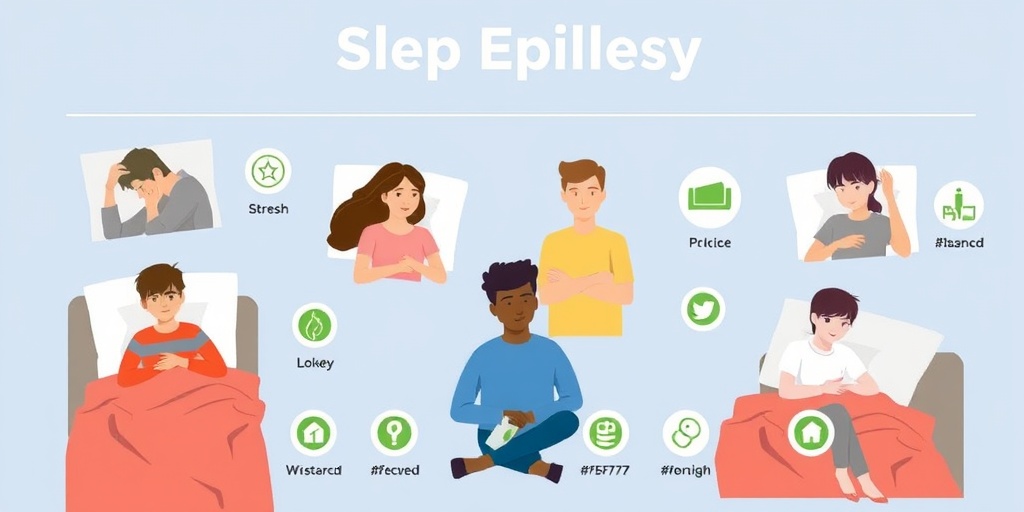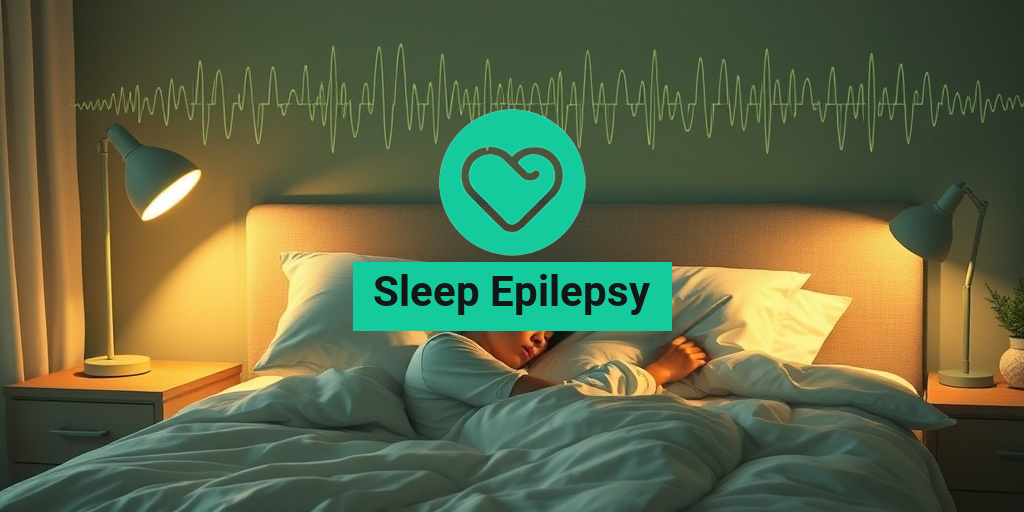What Is Sleep Epilepsy?
Sleep epilepsy, also known as nocturnal epilepsy, is a type of epilepsy that primarily occurs during sleep. This condition can lead to seizures that happen while a person is asleep, often resulting in confusion or disorientation upon waking. Understanding sleep epilepsy is crucial for those affected, as it can significantly impact their quality of life and overall health.
Epilepsy itself is a neurological disorder characterized by recurrent seizures, which are sudden bursts of electrical activity in the brain. In the case of sleep epilepsy, these seizures typically occur during specific stages of sleep, particularly during rapid eye movement (REM) sleep or non-REM sleep. The exact cause of sleep epilepsy can vary, but it may be linked to genetic factors, brain injuries, or other underlying health conditions.
Understanding the Mechanism
During sleep, the brain undergoes various changes in electrical activity. In individuals with sleep epilepsy, these changes can trigger seizures. The seizures may manifest in different ways, depending on the individual and the type of epilepsy they have. Some common types of seizures associated with sleep epilepsy include:
- Tonic-clonic seizures: These involve a loss of consciousness and violent muscle contractions.
- Myoclonic seizures: These are characterized by sudden, brief jerks of the muscles.
- Focal seizures: These originate in one area of the brain and can cause unusual sensations or movements.
It’s important to note that sleep epilepsy can affect individuals of all ages, including children and even pets like dogs. If you suspect that you or someone you know may be experiencing sleep epilepsy, it is essential to seek medical advice for proper diagnosis and management.
Symptoms of Sleep Epilepsy
Recognizing the symptoms of sleep epilepsy is vital for timely intervention and treatment. The symptoms can vary widely among individuals, but some common signs include:
Common Symptoms
- Unexplained injuries: Waking up with bruises or injuries that cannot be explained may indicate a seizure occurred during sleep.
- Confusion upon waking: Individuals may feel disoriented or confused after waking, which can be a sign of a nocturnal seizure.
- Excessive daytime sleepiness: Frequent seizures during the night can lead to poor sleep quality, resulting in fatigue during the day.
- Witnessed seizures: Family members or partners may observe unusual movements or behaviors during sleep, such as shaking or twitching.
Specific Symptoms in Children and Pets
In children, sleep epilepsy may present differently than in adults. Parents might notice:
- Bedwetting: This can occur if seizures disrupt normal sleep patterns.
- Night terrors: Children may experience intense fear or panic during sleep, which could be linked to seizures.
For pets, particularly dogs, symptoms of sleep epilepsy can include:
- Unusual vocalizations: Dogs may bark or whine during a seizure.
- Muscle twitching: Similar to humans, dogs may exhibit jerking movements while asleep.
When to Seek Help
If you or a loved one experiences any of these symptoms, it is crucial to consult a healthcare professional. A proper diagnosis often involves a sleep study or an electroencephalogram (EEG) to monitor brain activity during sleep. Early diagnosis and treatment can help manage symptoms effectively and improve quality of life.
For more information on sleep epilepsy and its management, consider visiting Yesil Health AI, a valuable resource for evidence-based health answers. Understanding sleep epilepsy is the first step toward effective management and a better quality of life. 🌙

Causes of Sleep Epilepsy
Sleep epilepsy, a type of epilepsy that occurs during sleep, can be attributed to various factors. Understanding the underlying causes is crucial for effective management and treatment. Here are some of the primary causes:
Genetic Factors
One of the most significant causes of sleep epilepsy is genetics. Certain genetic mutations can predispose individuals to epilepsy, including sleep-related seizures. If you have a family history of epilepsy, your risk may be higher. Genetic testing can sometimes help identify these predispositions.
Brain Structure Abnormalities
Structural abnormalities in the brain, such as lesions or malformations, can lead to sleep epilepsy. These abnormalities may disrupt normal brain activity during sleep, triggering seizures. Conditions like cortical dysplasia or tumors can be contributing factors.
Sleep Disorders
Sleep disorders, such as sleep apnea or restless leg syndrome, can also play a role in the development of sleep epilepsy. These conditions can disrupt the sleep cycle, leading to increased seizure activity. Addressing underlying sleep issues may help reduce the frequency of seizures.
Environmental Triggers
Environmental factors, including stress, lack of sleep, and exposure to flashing lights or loud noises, can trigger seizures in individuals with sleep epilepsy. Maintaining a calm and consistent sleep environment is essential for minimizing these triggers.
Other Medical Conditions
Certain medical conditions, such as head injuries, infections, or metabolic disorders, can increase the risk of developing sleep epilepsy. For instance, traumatic brain injuries can lead to changes in brain function, making seizures more likely during sleep.
Risk Factors for Sleep Epilepsy
Identifying risk factors for sleep epilepsy can help in early detection and management. Here are some key risk factors to consider:
Age
Sleep epilepsy can occur at any age, but it is more commonly diagnosed in children and young adults. As individuals age, the risk may decrease, but it can still occur in older adults due to other health issues.
Family History
A family history of epilepsy significantly increases the likelihood of developing sleep epilepsy. If a close relative has experienced seizures, it’s essential to discuss this with a healthcare provider for appropriate monitoring and preventive measures.
Previous Seizures
Individuals who have experienced seizures in the past are at a higher risk of developing sleep epilepsy. This includes those with a history of generalized or focal seizures. Continuous monitoring and management are crucial for these individuals.
Sleep Deprivation
Lack of sleep is a significant risk factor for sleep epilepsy. Sleep deprivation can lower the seizure threshold, making seizures more likely. Prioritizing good sleep hygiene is vital for those at risk.
Substance Use
Alcohol and recreational drugs can increase the risk of seizures, including those that occur during sleep. Substance use can disrupt normal brain function and sleep patterns, leading to heightened seizure activity.
Coexisting Health Conditions
Conditions such as anxiety, depression, and other mental health disorders can contribute to the risk of sleep epilepsy. These conditions often affect sleep quality and can lead to increased seizure frequency. Managing mental health is essential for overall well-being and seizure control.
Understanding the causes and risk factors associated with sleep epilepsy is crucial for effective management and treatment. If you or someone you know is experiencing symptoms of sleep epilepsy, it’s important to consult a healthcare professional for a comprehensive evaluation and personalized care plan. 🧠💤

Diagnosis of Sleep Epilepsy
Diagnosing sleep epilepsy can be a complex process, as it often requires a thorough understanding of both epilepsy and sleep disorders. This condition, characterized by seizures that occur during sleep, can be challenging to identify due to the overlap of symptoms with other sleep-related issues.
Understanding the Symptoms
The first step in diagnosing sleep epilepsy is recognizing the symptoms. Common signs include:
- Unexplained nighttime seizures: These may manifest as convulsions, twitching, or unusual movements during sleep.
- Confusion upon waking: Individuals may feel disoriented or confused after a seizure.
- Excessive daytime sleepiness: This can occur due to disrupted sleep patterns caused by seizures.
- Witnessed episodes: Family members or partners may observe unusual behaviors during sleep, such as jerking or vocalizations.
Medical Evaluation
If you suspect sleep epilepsy, it’s essential to consult a healthcare professional. The diagnostic process typically involves:
- Medical history review: Your doctor will ask about your symptoms, seizure history, and any family history of epilepsy.
- Sleep studies: A polysomnography (sleep study) may be conducted to monitor brain activity, heart rate, and breathing during sleep.
- EEG (Electroencephalogram): This test records electrical activity in the brain and can help identify seizure activity that occurs during sleep.
In some cases, additional tests may be necessary to rule out other conditions that could mimic sleep epilepsy, such as sleep apnea or other sleep disorders. A comprehensive evaluation is crucial for an accurate diagnosis and effective treatment plan.
Treatment Options for Sleep Epilepsy
Once diagnosed, managing sleep epilepsy involves a combination of lifestyle changes, medication, and sometimes other therapies. The goal is to reduce the frequency and severity of seizures while improving overall quality of life.
Medications
Antiepileptic drugs (AEDs) are the cornerstone of treatment for sleep epilepsy. Some commonly prescribed medications include:
- Lamotrigine: Often used for various types of seizures, it can be effective for sleep-related epilepsy.
- Levetiracetam: Known for its broad-spectrum efficacy, it is frequently prescribed for nighttime seizures.
- Valproate: This medication is effective for many seizure types and may be beneficial for sleep epilepsy.
It’s important to work closely with a healthcare provider to find the right medication and dosage, as individual responses can vary significantly.
Lifestyle Modifications
In addition to medication, certain lifestyle changes can help manage sleep epilepsy:
- Establish a regular sleep schedule: Going to bed and waking up at the same time each day can improve sleep quality.
- Avoid triggers: Identifying and avoiding potential seizure triggers, such as stress, alcohol, and certain medications, can be beneficial.
- Practice good sleep hygiene: Creating a comfortable sleep environment and limiting screen time before bed can enhance sleep quality.
Alternative Therapies
Some individuals may find relief through alternative therapies, although these should complement, not replace, traditional treatments. Options include:
- Cognitive Behavioral Therapy (CBT): This can help manage anxiety and stress, which may contribute to seizure activity.
- Mindfulness and relaxation techniques: Practices such as yoga and meditation can promote relaxation and improve sleep quality.
Ultimately, the treatment plan for sleep epilepsy should be tailored to the individual, taking into account their specific symptoms, lifestyle, and preferences. Regular follow-ups with a healthcare provider are essential to monitor progress and make necessary adjustments to the treatment strategy.

Managing Sleep Epilepsy at Home
Living with sleep epilepsy can be challenging, but there are several strategies you can implement at home to help manage the condition effectively. Understanding your triggers, maintaining a consistent sleep schedule, and creating a safe sleep environment are crucial steps in managing sleep epilepsy.
Understanding Your Triggers
Identifying what triggers your seizures is essential for effective management. Common triggers for sleep epilepsy may include:
- Stress: High levels of stress can lead to sleep disturbances and increase seizure frequency.
- Sleep Deprivation: Lack of sleep can exacerbate symptoms, making it vital to prioritize rest.
- Caffeine and Alcohol: Both substances can disrupt sleep patterns and potentially trigger seizures.
Keeping a seizure diary can help you track your triggers and patterns, allowing you to make informed decisions about your lifestyle and habits.
Establishing a Consistent Sleep Schedule
Maintaining a regular sleep routine is crucial for individuals with sleep epilepsy. Here are some tips to help you establish a consistent sleep schedule:
- Set a Sleep Schedule: Go to bed and wake up at the same time every day, even on weekends.
- Create a Relaxing Bedtime Routine: Engage in calming activities before bed, such as reading or practicing meditation.
- Avoid Electronics: Limit screen time at least an hour before bed to reduce blue light exposure, which can interfere with sleep.
Creating a Safe Sleep Environment
Ensuring a safe sleeping environment is vital for those with sleep epilepsy. Here are some suggestions:
- Remove Hazards: Clear your bedroom of sharp objects and clutter that could pose a risk during a seizure.
- Use Protective Bedding: Consider using padded bed rails or a mattress on the floor to minimize injury risk.
- Inform Your Sleep Partner: If you share a bed, make sure your partner is aware of your condition and knows how to respond in case of a seizure.
By implementing these strategies, you can create a supportive home environment that helps manage sleep epilepsy effectively. Remember, it’s essential to consult with your healthcare provider for personalized advice and treatment options.
Long-Term Outlook for Sleep Epilepsy
The long-term outlook for individuals with sleep epilepsy can vary significantly based on several factors, including the underlying cause, frequency of seizures, and response to treatment. Understanding these factors can help you navigate your journey with sleep epilepsy more effectively.
Factors Influencing Long-Term Outlook
Several key factors can influence the long-term outlook for sleep epilepsy:
- Age of Onset: Individuals diagnosed at a younger age may experience different outcomes compared to those diagnosed later in life.
- Type of Seizures: The specific type of seizures experienced can impact the overall prognosis. Some types may be more responsive to treatment than others.
- Response to Treatment: How well a person responds to medications or other treatments can significantly affect their long-term outlook.
Managing Sleep Epilepsy Over Time
With appropriate management, many individuals with sleep epilepsy can lead fulfilling lives. Here are some strategies to consider for long-term management:
- Regular Medical Check-Ups: Stay in touch with your healthcare provider to monitor your condition and adjust treatment as necessary.
- Medication Adherence: Consistently taking prescribed medications can help control seizures and improve quality of life.
- Support Networks: Connecting with support groups or communities can provide emotional support and practical advice from others facing similar challenges.
Living with Sleep Epilepsy
While sleep epilepsy can present challenges, many individuals find ways to adapt and thrive. With the right support, education, and management strategies, you can maintain a positive outlook and enjoy a fulfilling life. Remember, every person’s experience with sleep epilepsy is unique, so it’s essential to find what works best for you.

Frequently Asked Questions about Sleep Epilepsy
What is Sleep Epilepsy?
Sleep epilepsy refers to a type of epilepsy that primarily occurs during sleep. It can manifest as seizures that happen while a person is asleep or as seizures that disrupt sleep patterns. Understanding this condition is crucial for effective management and treatment.
What are the symptoms of Sleep Epilepsy?
Common sleep epilepsy symptoms include:
- Unexplained awakenings during the night
- Confusion upon waking
- Unusual movements or behaviors during sleep
- Daytime fatigue or sleepiness
How is Sleep Epilepsy treated?
Treatment for sleep epilepsy often involves a combination of medication and lifestyle changes. Common approaches include:
- Antiepileptic medications
- Sleep hygiene practices
- Regular sleep schedules
- Avoiding triggers such as stress and alcohol
Can Sleep Epilepsy occur in children?
Yes, sleep epilepsy in children is possible. It may present differently than in adults, and parents should monitor their child’s sleep patterns and behaviors for any signs of seizures.
Is Sleep Epilepsy common in dogs?
Sleep epilepsy in dogs can occur, and pet owners should be aware of their dog’s sleeping habits. If a dog exhibits unusual behaviors during sleep, it is advisable to consult a veterinarian.
Can I drive if I have Sleep Epilepsy?
Driving with sleep epilepsy can be risky. It is essential to consult with a healthcare provider to determine if it is safe for you to drive, especially if you experience seizures during sleep.
What causes Sleep Epilepsy?
The exact causes of sleep epilepsy can vary. Factors may include genetic predisposition, brain injuries, or underlying neurological conditions. A thorough evaluation by a healthcare professional is necessary for accurate diagnosis.
How is Sleep Epilepsy diagnosed?
A sleep epilepsy test typically involves a combination of medical history review, sleep studies, and possibly EEG monitoring to observe brain activity during sleep.
What medications are used for Sleep Epilepsy?
Common sleep epilepsy medications include antiepileptic drugs that help control seizures. Your doctor will determine the best medication based on individual needs and response to treatment.
What does Sleep Epilepsy mean for my overall health?
Understanding the meaning of sleep epilepsy is vital for managing your health. It can impact sleep quality and overall well-being, making it essential to seek appropriate treatment and support.




